After year’s absence, messengers return for ministry, business, fellowship
By Lonnie Wilkey
Editor, Baptist and Reflector
lwilkey@tnbaptist.org
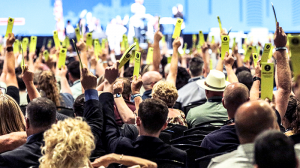
Baptist Messengers show their ballots during a vote at the 2021 SBC annual meeting in Nashville.
— Photo by Eric Brown
NASHVILLE — One year after COVID-19 forced the cancelation of the 2020 annual meeting of the Southern Baptist Convention, Southern Baptists came out in force in Nashville on June 15-16 with the highest messenger count since 1995 — and the largest since the turn of the century in 2000.
The messenger count totaled 15,726, marking the largest gathering since 11,959 messengers attended the SBC annual meeting in 2000 in Orlando. The number also far exceeded the 11,641 messengers who attended the last SBC held in Nashville in 2005.
In addition to the registered messengers, the annual meeting also drew 3,856 guests and 1,892 exhibitors for a total of 21,474 attendees.
Tennessee led the way in number of messengers with 2,012, followed by Georgia, 1,596; Alabama, 1,151; Texas, 1,125; Kentucky, 1,040; North Carolina, 984; Florida, 981, and Mississippi, 700.
Messengers, however, did not come just to be seen but also to be heard. Messengers presented 32 motions from the floor (the most since 2010), and adopted 10 resolutions, including one from the floor when the Resolutions Committee did not present it in their report, authorized the creation of a task force, appointed by the new SBC president, to oversee an independent review of the Executive Committee over allegations of mishandling reports of sexual abuse. Messengers overwhelmingly defeated a revision of the SBC Business and Financial Plan proposed by the EC.
Alabama Baptist pastor Ed Litton was elected the new president of the Southern Baptist Convention in a run-off with Georgia pastor Mike Stone.
SBC seminary president R. Albert Mohler and Randy Adams, a state convention executive director also were candidates for the office.
Officers
Litton, pastor of Redemption Church in Saraland, Ala., defeated Mike Stone, pastor of Emmanuel Baptist Church in Blackshear, Ga., in a runoff by earning 52.04 percent (6,834) of the votes among the 13,131 ballots cast by the 15,691 messengers. Stone received 47.81 percent (6,278).
Earlier in the afternoon of June 15, Stone received the most votes among the four SBC presidential candidates, but none of the candidates received the required 50 percent of the votes needed to avoid a run-off.
Stone received 5,216 votes in the initial voting (36.48 percent), followed by Litton with 4,630 (32.38), Al Mohler with 3,764 (26.32) and Randy Adams with 673 (4.71).
Litton was nominated by former Southern Baptist Convention president Fred Luter, who said that the SBC needs “strong, yet humble, leadership. … We need a uniter — and Ed is uniquely qualified for that role,” Luter said.
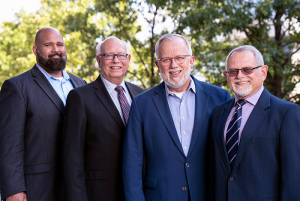
New SBC officers are (left to right) First Vice President Lee Brand Jr., Recording Secretary John Yeats, President Ed Litton and Registration Secretary Don Currence. Not pictured is second vice president Ramon Medina.
— Photo by Adam Covington
Stone was nominated by Dean Haun, pastor of First Baptist Church, Morristown.
Haun said Stone — like King David — would be a fearless champion. Haun noted that Stone “understands that the headquarters of the SBC … is in the local church. He observed that Stone would challenge “the Goliaths” that the SBC is facing, including declining baptisms and overarching cultural decline. He said Stone would be a “champion of the Cooperative Program.”
A Tennessee seminary dean was elected first vice president. Lee Brand Jr., vice president and dean of Mid-America Baptist Theological Seminary, Cordova, received 327 votes more than California pastor Anthony Dockery – 2,860 to 2,533 – in becoming first vice president of the SBC.
Brand was nominated by Danny Sinquefield, pastor of Faith Baptist Church, Bartlett. When Sinquefield announced he would nominate Brand, he noted that the seminary dean “understands the challenges facing Southern Baptist churches today,” said Sinquefield. “He has walked through many years of ministry and sees the church and the convention as only a long-term pastor can. I think his experience in both rural and urban ministry contexts makes him an ideal candidate to serve in the SBC. He understands pastors, churches, and the SBC needs – both present and future.”
Ramon Medina, lead pastor of the Spanish ministry at Champion Forest Baptist Church in Houston, was elected second vice president. Medina received 3,103 votes to Georgia pastor Javier Chavez’s 2,724 in a runoff.
Stone, Brand and Chavez were all supported by the Conservative Baptist Network (CBN), a recently formed group alleging leftward drift in the convention.
For the 24th time, John Yeats will serve as recording secretary. The Missouri Baptist Convention executive director received 3,545 votes while first-time nominee Adam Blosser, pastor of Goshen Baptist Church in Spotsylvania, Va., received 2,753.
Don Currence, administrative pastor at First Baptist Church in Ozark, Mo. was reelected by acclamation to the post of registration secretary.
Messengers challenge ruling
The Executive Committee (an 86-member body charged with acting on the SBC’s behalf between annual meetings) drew opposition at multiple junctures, with messengers claiming the EC had too much authority and needed to be held accountable.
Murfreesboro pastor Grant Gaines of Belle Aire Baptist Church moved that the new SBC president appoint a task force to oversee a previously announced investigation of alleged EC mishandling of sexual abuse claims. Initially, the motion was referred to the EC by the Committee on Order of Business, but messengers overturned the ruling by a two-thirds vote and overwhelmingly adopted the motion on June 16.
Gaines’ motion said the task force, which will be appointed within 30 days by new SBC President Ed Litton, should be composed of members of Southern Baptist churches and “experts in sexual abuse and the handling of sexual abuse related dynamics.”
When he made the motion, Gaines said: “In order for this investigation to be truly external, independent and unbiased, we can’t have the Executive Committee setting the terms of the investigation themselves. They can’t be the ones to hold themselves accountable.”
“This might seem like too much trouble to some, but I assure you it is the least we can do for abuse survivors,” Gaines said to applause.
Gaines’ motion was one of 32 considered by SBC messengers (see list here).
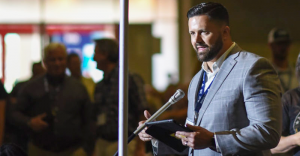
Grant Gaines, pastor of Belle Aire Baptist Church in Murfreesboro, Tenn., presented a motion calling for a task force to oversee a third-party investigation into allegations of mishandling abuse claims at the SBC Executive Committee.
— Photo by Karen McCutcheon
The EC had voted June 14 against a similar proposal by one of its own members, Jared Wellman of Texas.
EC President Ronnie Floyd said in a statement following the convention’s action, “Today’s decision, in whose outcome we are confident, will have the ultimate blessing of removing all doubt in the minds of our community of Southern Baptists allowing us to chart a more confident future together.”
Tough Week for EC
The EC encountered an overwhelming defeat in a proposed revision to the SBC’s Business and Financial Plan. EC officer Robyn Hari said the proposal sought to strike a balance between accountability and autonomy of the SBC entities. But messenger Vance Pitman of Nevada called the proposal “an unprecedented expansion of the Executive Committee powers.”
The recommendation failed on a raised-hand vote.
The convention approved Vision 2025, a five-year plan setting a series of goals for Great Commission advancement. Messengers added to the EC’s five proposed Vision 2025 goals on missions, evangelism and CP giving a sixth stating the convention’s intent to eliminate all incidents of racism and sexual abuse. They also amended a goal placing emphasis on reaching teenagers to those under age 18.
Another EC recommendation rejected by messengers was a proposed revision of Lifeway Christian Resources’ Mission and Ministry Statement. The proposal, initiated at the request of Lifeway trustees, was defeated on a ballot vote after messenger Michael Schultz of Kentucky spoke against its adoption due to a proposed deletion of Lifeway’s responsibility to assist churches with “homeschool ministries.”
The EC also lost an officer when Tom Tucker, a vocational evangelist from South Carolina, was not given a second term by messengers, who voted against an attempt to overturn the Committee on Nominattions, which had declined to renominate him.
Tucker, a member of the CBN steering council, had been reelected as vice chairman June 14 by the EC, which acted despite the knowledge that while eligible to serve, his term was expiring and he was not among nominees to the EC for the coming year, and that he could only fulfill the post if messengers amended the 2021 Committee on Nominations report to include Tucker among nominees.
Messengers did accept EC proposals granting the second of two required approvals to an SBC constitutional amendment listing racism and mishandling sex abuse as grounds for disfellowshiping a church. Messengers also approved the EC’s recommendation of a $190 million Cooperative Program Allocation Budget for 2021-22.
Resolutions
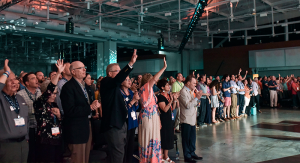
Southern Baptists worship during the IMB’s Sending Celebration for 64 new missionaries June 14.
-Photo by Karen McCutcheon
A day after overruling the Resolutions Committee, messengers adopted a resolution June 16 calling for “abolishing abortion immediately, without exception or compromise.”
The Resolutions Committee had declined the resolution, reasoning that while “messengers would agree with some aspects of this resolution,” the issue of abortion was addressed in another resolution condemning the repeal of the Hyde Amendment, which prevents federal funding of abortion.
But after one of the resolution’s nine co-authors spoke to the motion June 15, messengers brought it to the floor with a two-thirds vote. It was adopted after an amendment softening its language.
The resolution was among 10 resolutions messengers approved this year. Among other recommendations adopted, all receiving strong support from messengers, were measures recommending that churches permanently bar sex abusers from the pastorate; a resolution rejecting any theory that credits racism to anything other than sin; and a resolution denouncing the Equality Act, a far-reaching gay and transgender rights bill that critics warn would devastate freedom of religion and conscience, as well as protections for women, girls and unborn children.
Critical Race Theory (CRT) — the subject of a 2019 SBC resolution that has sparked controversy over the past two years — drew several mentions during the convention, including messenger motions and resolution submissions calling for its denunciation as well as questions to SBC presidents during their reports. Yet no official convention action addressed CRT by name.
Instead, messengers adopted a broad resolution regarding race and racial reconciliation. The resolution repudiated “any theory or worldview that denies that racism, oppression, or discrimination is rooted, ultimately, in anything other than sin.”
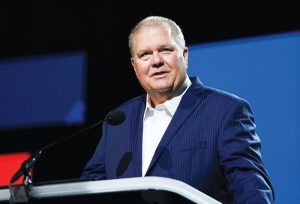
Randy C. Davis, executive director of the Tennessee Baptist Mission Board, welcomes a historic number of Southern Baptist messengers to the two-day 2021 SBC annual meeting during the opening session.
It also reaffirmed a resolution regarding racial reconciliation on the SBC’s 150th anniversary in 1995 in which messengers apologized to African Americans for “condoning and/or perpetuating individual and systemic racism.”
Tennessee pastor Shawn Allred of First Baptist Church, Kenton, drafted a resolution denouncing CRT and intersectionality in the fall of 2019 that was overwhelmingly approved by Tennessee Baptist messengers at Summit. He regretted that the SBC Resolutions Committee would not specifically cite CRT in the resolution they presented.
He told the Baptist and Reflector, “I was extremely disappointed that no resolution offered to the convention body disavowed the dangerous worldview of CRT and intersectionality.
“It is clear that the convention leadership and the resolutions committee had no intention of addressing what so many believe needs to be confronted. A resolution that specifically named CRT and intersectionality and rejected it wholly was presented to the Resolutions Committee with the signatures of at least 1,300 concerned members of SBC churches from all across our nation (including several from Tennessee) and was still not brought before the body of messengers.”
He expressed appreciation for Tennessee taking a stand in 2019 against CRT and intersectionality. “I hope and pray that many more deliberative bodies of SBC churches, associations, and state conventions will take to task the complete rejection of CRT and intersectionality and keep pursuing justice rooted in God’s Word and not the social justice of the world. The great news is that no matter what the results of the SBC convention, we get to preach and proclaim Jesus until He comes,” Allred said.
Racial diversity
The SBC constitutional amendment against racism was among several ways messengers attempted to catalyze ethnic diversity in the convention.
Juan Sanchez, pastor of High Pointe Baptist Church in Austin, Texas, became the first Hispanic elected convention preacher. He will deliver the convention sermon next year in Anaheim, Calif. Messengers also elected a Hispanic first vice president, Ramón Medina, lead pastor of the Spanish ministry at Champion Forest Baptist Church in Houston. Medina was elected in a runoff over another Hispanic nominated for the post, Georgia pastor Javier Chavez.
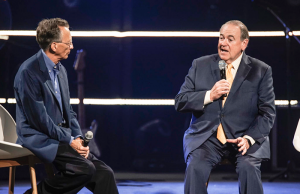
Tennessee pastor Jerry Drace (left) interviews former Arkansas Gov. Mike Huckabee at the June 13 worship service of the Southern Baptist Evangelists.
— Photo by Abbey Sprinkle
Southern Baptists tapped to serve on committees likewise were diverse. A majority (51 percent) of SBC President J.D. Greear’s appointments to committees were non-Anglo, as were 30 percent of those elected to serve on boards and committees.
In his final presidential address, Greear exhorted Southern Baptists to make clear their disdain of racism and sexual abuse while avoiding characteristics Jesus assailed among the Pharisees in Matthew 23. Jesus rebuked the Pharisees for considering their own traditions equal to Scripture, adhering to minutia of the law while avoiding the meat of the law, and ignoring God’s focus on the outsider.
“I’m not saying that anyone who disagrees with me on something is a Pharisee. No, for sure, I see some of these qualities present in me also,” Greear said.
But he challenged Southern Baptists to search their own hearts in the address, which drew several rounds of applause and standing ovations.
One standing ovation came when Greear, addressing racial tension within the SBC, spoke to “people of color,” and said: “We need you.”
Greear called Baptists to be Great Commission Baptists, to exalt the gospel above all, and to unify around the gospel and the Great Commission.
Other items
• Sixty-four new International Mission Board missionaries were appointed June 14 in a Sending Celebration. They will join 3,631 IMB missionaries already on the field around the world. The vast majority of the new missionaries stood behind a screen during the service, as they could not be identified due to security concerns in their locations of service.
• The North American Mission Board reported that Southern Baptists have planted more than 8,200 churches in the past decade. They comprise nearly 17 percent of all Southern Baptist churches and represent nearly 19 percent of all baptisms reported in the SBC.
• Ben Mandrell, Lifeway Christian Resources president and CEO, expressed confidence in the future of the organization during his report to messengers June 16. “I am encouraged by the report that I bring to you today,” Mandrell told messengers. “Lifeway Christian Resources exists to create resources that radically impact people’s lives and churches.” Despite challenges brought on by the pandemic and some that existed prior to 2020, Mandrell informed those gathered that Lifeway was in a strong position. “Despite what you have heard, Lifeway is not in a fire sale,” he said. “Lifeway is getting focused.”
In 2020, Mandrell said, Lifeway sold more than 2.4 million Bibles and had more than 100,000 women join a Lifeway Women online Bible study. Mandrell also addressed the recent sale of the Lifeway headquarters in Nashville. Funds from that will be used to strengthen the pension fund, fortify cash reserves, invest strategically in what best serves local churches, and purchase a modest space for creative thinking and collaborative work by employees. Because the organization embraced a work-from-anywhere culture, Mandrell said the organization was hiring people from “all parts of the country” that enables Lifeway to create resources that fit various cultures and serve a wider range of churches.
• Florida pastor Willy Rice gave Southern Baptists somewhat of an investment pitch June 16. Go for gold, silver and precious jewels, he said, not the wood, hay and straw that has its short-term advantages but little benefit in terms of longevity. Rice, senior pastor of Calvary Church in Clearwater, Fla., delivered the convention sermon for the 2021 SBC Annual Meeting based on 1 Corinthians 3:3-17. The passage, he explained, gives a clear picture of division in the early church that grew out of competing allegiances to leadership. Such misplaced devotion, he pointed out, can be observed today, he noted.
